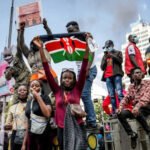The United Nations International Children’s Emergency Fund (UNICEF) has urged stakeholders to enforce the rights of children as prescribed in the Borno State Child Protection Law.
Governor Babagana Zulum of Borno State, northeast Nigeria, signed the bill in January 2022, marking an end to years of efforts to provide a legal framework that recognises the rights of children in the state to education, health and protection from all forms of abuse.
Borno, with the Child Protection Bill signed into law, becomes the 29th state in Nigeria to domesticate the Child Rights Act enacted by the federal government in 2003.
The country operates a federal system of government, meaning laws passed by the National Assembly do not automatically become applicable in all of the country’s 36 states.
UNICEF said that the signing of the Child Protection Bill into law in Borno State was a victory for the children of the state.
The UN agency also said that the signing was a recognition of a legal framework for children’s protection against recruitment and use by armed groups, child labour and sexual abuse, among other violations of their rights.
With more than 23 million girls and women who were married as children, Nigeria has the largest number of child brides in Africa.
‘For too long, children in Borno State have suffered the consequences of protracted conflict. Children have died or been maimed from unexploded devices, been kidnapped and recruited and used by armed groups’, UNICEF Representative in Nigeria, Peter Hawkins, said in a statement.
‘Girls have been especially impacted, including by sexual abuse and violence. The Borno State Child Protection Law will offer these children hope that things can change and perpetrators held accountable’.
Hawkins commended the governor, the Borno State House of Assembly and other stakeholders who worked to domesticate the Child Rights Act in the state.
‘UNICEF expects that stakeholders will go on to enforce the rights of children as prescribed in the Borno State Child Protection Law’, he added.
UNICEF called on the states that have yet to domesticate the law – Adamawa, Bauchi, Gombe, Kebbi, Yobe, Kano and Zamfara – to expedite action to do so.
Source: UNICEF
Photo source: UNICEF






